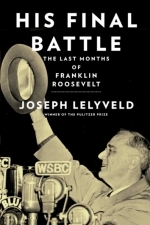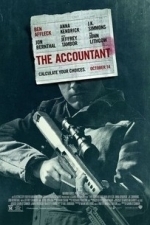
Some Other and Wider Destiny: Wakefield Grammar School Foundation and the Great War
Book
The First World War demanded one of the most sustained and extraordinary efforts ever made by the...

Secret photos: KYMS vault to hide and lock media
Photo & Video and Utilities
App
Kyms looks like a working and stylish calculator App but it hides an inviolable vault in which to...

His Final Battle: The Last Months of Franklin Roosevelt
Book
“By far the most enigmatic leading figure” of World War II. That’s how the British military...
Biography history politics
Gareth von Kallenbach (980 KP) rated The Accountant (2016) in Movies
Jun 19, 2019
In the new film “The Accountant” we are introduced to Christian as he prepares taxes for a rural couple. The quiet, and social awkward man is a whizz with numbers but thanks to a form of Autism, Christian is socially awkward and has an extreme series of regiments he uses to cope with the modern world.
Much of his life is told through flashbacks but we learn that his military father insisted that he and his brother learn to defend themselves after their mother left them.
FBI agent Ray King (J.K. Simmons) is facing retirement and has past history with The Accountant as he is known, and wants to resolve the situation before he retires. As such he recruits and coerces a young agent to help him track down The Accountant with little more to go on other than reputation and some vague photos.
At the same time Christian is introduced to a company via his service who suspects that money is being stolen from them. The C.E.O. Lamar Black (John Lithgow), is eager to get to the bottom of an irregularity found by bookkeeper Dana Cummings (Anna Kendrick).
Christian tears through 15 years of books in one night and locates an intricate scheme to steal millions yet make the company look like it has kept gaining money and this sets into action a chain of events with dire consequences.
At the same time, a mysterious man (John Bernthal), is eliminating those in the way and has set his sights on both Christian and Dana.
Christian however is far from a weak pacifist as thanks to his work and his father’s training, he is brutally efficient and deadly with his hands, feet, and all manner of weapons.
With danger all around them, Christian and Dana must survive and get to the bottom of the mystery while avoiding Agent King and the authorities.
What follows is an action filled thriller that was an exciting adventure filled with twists, turns, and solid performances.
The film does offer a big twist which I saw coming 40 minutes out, but despite this the solid cast and great work by Affleck, Simmons, and company make this a pleasant surprise and one you will not want to miss.
http://sknr.net/2016/10/14/the-accountant/
Darren (1599 KP) rated 7 Seconds (2005) in Movies
Jun 20, 2019
Actor Review: Wesley Snipes – Jack Tuliver thief who is also ex-delta force who arranges a heist that he gets double crossed on and left to find out by whom. Snipes’ gets some good one-liners and really is the only good thing about this film. (6/10)
snipes
Actor Review: Tamzin Outhwaite – Sgt Kelly Anders a military Police officer who somehow gets caught up in the middle of the event but is the only one with brains. Awful performance she really should have stuck to the soaps. (2/10)
tamzin
Actor Review: Deobia Oparei – Spanky when things are going his way he is all talk but when it’s not he runs and hides. Funny character, but in the end a waste of use of the actors potential talent. (4/10)
spanky
Actor Review: Georgina Rylance – Suza, Jack’s partner in the crime but gets kidnapped leading him to try his best to save her. Simple support role that doesn’t get a chance to do much. (4/10)
suza
Actor Review: Peter Lee-Wilson – Alexsie Kutchinov the gangster who wants the heist prize and will do anything in his power to get it. Good performance as he gets to use the characters disability well. (6/10)
alex
Director Review: Simon Fellows – Can tell a known thinking man’s action thriller well but doesn’t try anything new. (5/10)
Action: The car chases work well, and some fights are good. (7/10)
Crime: Simple crime side to the story. (5/10)
Thriller: Doesn’t really get you routing for anyone or anywhere near the edge of the seat. (5/10)
Believability: No (0/10)
Chances of Tears: No (0/10)
Settings: Set in Romania we get some good settings and look at the city. (8/10)
Suggestion: This is one that is really just for late night TV viewing any other time would be waste of time and money. (Late Night)
Best Part: Car chase one
Worst Part: The Police
Action Scene Of The Film: Car chase
Kill Of The Film: Some the of henchmen
Oscar Chances: No
Chances of Sequel: No
Overall: Crime Caper With No Brains Required
https://moviesreview101.com/2014/07/22/7-seconds-2005/

Deng Xiaoping: A Revolutionary Life
Alexander V. Pantsov and Steven I. Levine
Book
Deng Xiaoping joined the Chinese Communist movement as a youth and rose in its ranks to become an...

Faces from the Front: Harold Gillies, the Queen's Hospital, Sidcup and the Origins of Modern Plastic Surgery
Book
Faces from the Front examines the British response to the huge number of soldiers who incurred...

Modern Greece: What Everyone Needs to Know
Book
Just a few years ago, Greece appeared to be a politically secure nation with a healthy economy....

The War of the Worlds by H. G. Wells
Podcast
Extraterrestrial invasion, the earth taken over by omniscient intelligences from Mars, the whole of...


